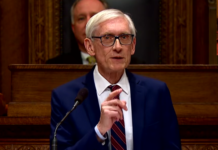Wisconsin manufacturing leaders are urging members of Congress to extend tax provisions enacted in 2017, warning a failure to do so would “constitute a massive tax increase” for their industry.
Wisconsin Manufacturers & Commerce President and CEO Kurt Bauer on Friday said “we just can’t afford to see that happen.” He spoke during an online news conference organized by WMC and the National Association of Manufacturers, focused on the federal tax and spending bill that recently cleared the House and is now before the Senate.
Bauer called for lowering energy costs by tapping into North American natural resources such as critical minerals and reducing the cost of doing business with “sensible regulatory relief” including changes to permitting.
“All of the aforementioned policy categories, which are critical to global competitiveness for U.S. manufacturing, are addressed to some degree in the reconciliation package pending before the Senate and should be included in the final bill,” he said. “Doing so will accomplish the goal of making U.S. manufacturing stronger, which should be a bipartisan objective.”
NAM has issued a brief that says Wisconsin would lose 110,000 jobs and $19.5 billion in GDP if Congress doesn’t “preserve pro-manufacturing tax policies” in the legislation and allows them to expire at the end of this year.
Austin Ramirez is president and CEO of Waukesha-based manufacturer Husco, vice chair for NAM’s Small and Medium Manufacturers Group and board chair for the Metropolitan Milwaukee Association of Commerce. He noted some elements of the 2017 tax cut have already expired in recent years, adding “Husco has had to trim our sails” as a result.
“Debt financing is now more expensive for all companies with significant depreciable assets, especially manufacturers like Husco,” he said. “And we can no longer immediately expense capital equipment costs, forcing Husco to spread smaller investments over many years. And the damage will pile up if Congress does not act.”
Ramirez also noted a tax code provision related to research and development expenses expired about two years ago, causing the company to amortize annual R&D expenses over a five-year period, meaning it can only deduct 20% of those expenses per year. By comparison, companies in China can deduct 200% of annual R&D expenses, he said.
“Our biggest geopolitical foe is incenting and encouraging R&D investment, while here in the U.S. today, because the provision has expired, we’re penalizing companies like Husco that are investing in R&D,” he said, adding “that’s a $20 million issue for me.”
Meanwhile, NAM President and CEO Jay Timmons on Friday urged members of the Senate to act early this summer on the tax bill. He argued companies’ plans for hiring and growing are at risk “without the certainty and competitiveness” provided by the legislation that cleared the House.
“The rocket fuel of tax reform, it touched communities all across the country, and that included big cities, small towns, main streets and certainly manufacturing shop floors,” he said. “But unfortunately, the rocket is nearly out of fuel … without action, the consequences will be absolutely devastating. More than 6 million American jobs lost, more than $1 trillion drained from our economy.”
When asked about the possibility of the bill’s failure contributing to a recession, Timmons said “uncertainty is a killer” for economic growth.
“If you lose 6 million jobs, I think by definition that is probably going to be recessionary,” he said. “So, there is a very good chance that we could see that if this doesn’t happen soon.”







